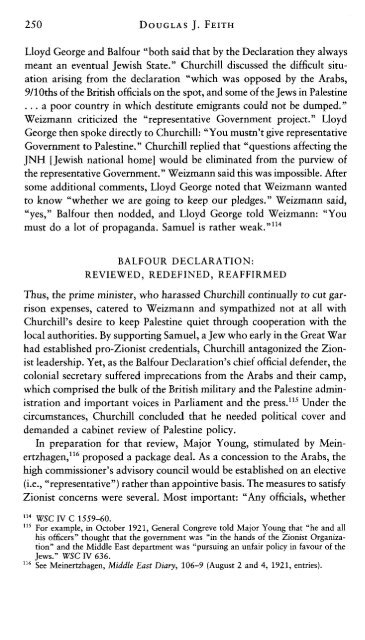Churchill, Palestine and Zionism, 1904-1922 - Douglas J. Feith
Churchill, Palestine and Zionism, 1904-1922 - Douglas J. Feith
Churchill, Palestine and Zionism, 1904-1922 - Douglas J. Feith
Create successful ePaper yourself
Turn your PDF publications into a flip-book with our unique Google optimized e-Paper software.
250 DOUGLAS J. FEITH<br />
Lloyd George <strong>and</strong> Balfour "both said that by the Declaration they always<br />
meant an eventual Jewish State." <strong>Churchill</strong> discussed the difficult situation<br />
arising from the declaration "which was opposed by the Arabs,<br />
9/1 Oths of the British officials on the spot, <strong>and</strong> some of the Jews in <strong>Palestine</strong><br />
... a poor country in which destitute emigrants could not be dumped."<br />
Weizmann criticized the "representative Government project." Lloyd<br />
George then spoke directly to <strong>Churchill</strong>: "You mustn't give representative<br />
Government to <strong>Palestine</strong>." <strong>Churchill</strong> replied that" questions affecting the<br />
JNH [Jewish national home] would be eliminated from the purview of<br />
the representative Government." Weizmann said this was impossible. After<br />
some additional comments, Lloyd George noted that Weizmann wanted<br />
to know "whether we are going to keep our pledges." Weizmann said,<br />
"yes," Balfour then nodded, <strong>and</strong> Lloyd George told Weizmann: "You<br />
must do a lot of propag<strong>and</strong>a. Samuel is rather weak.,,114<br />
BALFOUR DECLARATION:<br />
REVIEWED, REDEFINED, REAFFIRMED<br />
Thus, the prime minister, who harassed <strong>Churchill</strong> continually to cut garrison<br />
expenses, catered to Weizmann <strong>and</strong> sympathized not at all with<br />
<strong>Churchill</strong>'s desire to keep <strong>Palestine</strong> quiet through cooperation with the<br />
local authorities. By supporting Samuel, a Jew who early in the Great War<br />
had established pro-Zionist credentials, <strong>Churchill</strong> antagonized the Zionist<br />
leadership. Yet, as the Balfour Declaration's chief official defender, the<br />
colonial secretary suffered imprecations from the Arabs <strong>and</strong> their camp,<br />
which comprised the bulk of the British military <strong>and</strong> the <strong>Palestine</strong> administration<br />
<strong>and</strong> important voices in Parliament <strong>and</strong> the pressYs Under the<br />
circumstances, <strong>Churchill</strong> concluded that he needed political cover <strong>and</strong><br />
dem<strong>and</strong>ed a cabinet review of <strong>Palestine</strong> policy.<br />
In preparation for that review, Major Young, stimulated by Meinertzhagen,116<br />
proposed a package deal. As a concession to the Arabs, the<br />
high commissioner's advisory council would be established on an elective<br />
(i.e., "representative") rather than appointive basis. The measures to satisfy<br />
Zionist concerns were several. Most important: "Any officials, whether<br />
114 WSC IV C 1559-60.<br />
115 For example, in October 1921, General Congreve told Major Young that "he <strong>and</strong> all<br />
his officers" thought that the government was "in the h<strong>and</strong>s of the Zionist Organization"<br />
<strong>and</strong> the Middle East department was "pursuing an unfair policy in favour of the<br />
Jews." WSC IV 636.<br />
116 See Meinertzhagen, Middle East Diary, 106-9 (August 2 <strong>and</strong> 4, 1921, entries).


